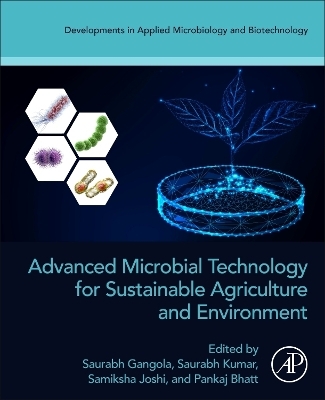
Advanced Microbial Technology for Sustainable Agriculture and Environment
Academic Press Inc (Verlag)
978-0-323-95090-9 (ISBN)
Moreover, it gives a deep understanding of the genetics of microbial biodegradation and different remediation mechanisms that help to re-establish the natural environment.
Saurabh Gangola is currently an Assistant Professor at Graphic Era Deemed to be University in the Department of Microbiology, Dehradun, India. He has completed his MSc and PhD in Microbiology from G. B. Pant University of Agriculture and Technology in Pantnaga, India. His area of specialization is bioremediation and biodegradation of xenobiotic compounds (including pesticides, hydrocarbons, and azo dye), degradation kinetics, microbial stress-responsive enzymes, bioinformatics, molecular biology, plant-microbe interaction, plant growth-promoting rhizobacteria, culturable and unculturable microorganisms, and metagenomics. He has published several research papers, review papers in highly reputed journals, book chapters, edited books (Springer and Elsevier) and also published patents. He has edited special issues as a guest editor in Scientific Reports and Frontiers in Microbiology. He has been a valued editorial board member of several national and international journals. Saurabh Kumar works in Agricultural Microbiology at ICAR- Research Complex for Eastern Region in Patna, India. Samiksha Joshi is currently an Assistant Professor, Swami Rama Himalayan University, Himalayan School of Biosciences, Department of Biosciences, Dehradun, Uttarakhand, India. She has completed her MSc and PhD in Microbiology from G. B. Pant University of Agriculture and Technology Pantnaga, India. Her area of expertise is microbiology, molecular biology, plant-microbe interaction, plant growth promoting rhizobacteria, metagenomics, biodegradation, and bioremediation. She has published 8 research and review articles in reputed international journals and has authored 8 book chapters. Dr. Pankaj Bhatt completed his PhD. in microbiology from G.B. Pant University of Agriculture and Technology, Pantnagar, India. His research focused on the molecular and microbiological basis of bioremediation. Dr Bhatt has published several articles in high impact factor leading journals including Scientific Reports, Frontiers in Microbiology, Chemosphere, Environmental research, World Journal of Microbiology and Biotechnology, and 3-Biotech. He has also published several book chapters on microbial biotechnology. Presently he is working as a Post-Doctoral researcher at Integrative Microbiology Research Centre, South China Agriculture University, Guangzhou China.
1. Microbial diversity and its application for plant growth promotion and bioremediation
2. Plant microbe interactions: signalling and perception
3. Role of plant growth promoting bacteria in sustainable agriculture
4. Rhizosphere metagenomics: applications in plant microbes’ interactions
5. Recent molecular and omics approaches to study rhizosphere functioning
6. Rhizosphere engineering for sustainable agriculture
7. Cultivation of unculturable microorganism: latest advancement and applications
8. Microbial enzymes and their mechanisms for plant growth promotion
9. Microbial inoculants and their impact on plant and soil health
10. PGPR mediated mitigation of biotic and abiotic stress in plants
11. Microbes as a biofertilizer and biopesticides for sustainable agriculture
12. Role of psychrophilic or psychrotolerant microorganism towards the development of hill agriculture
13. Genetic engineering in plant growth promontory microorganisms: opportunities and obstacles.
14. Tracking of microbial inoculants in agriculture soil
15. Fungal and bacterial diversity towards xenobiotic compound degradation
16. PGPR mediated bioremediation of toxic pollutants for sustainable environment and human health
17. Mitigation of soil heavy metal contamination through PGPR
18. Role of PGPR in arsenic bioremediation in agriculture crops
19. Microbial exopolysaccharide (EPS): its application in degradation of environmental pollutants
20. Technological advancement in tool and techniques used for biodegradation analysis
21. Mechanisms of microbial based biodegradation of environmental pollutants
22. Microbial nanotechnology for the development of sustainable agriculture and environment
23. Role of nanoparticles in soil heavy metal bioremediation
24. Insight into microbial metabolic pathways for degradation of different xenobiotic compounds
25. Role of microorganism in agricultural waste management
26. New insights into the enzymatic catalysis for the degradation of toxic chemicals
27. Future of PGPR based plant growth promotion and bioremediation technologies
28. The role of hidden microbes for sustainable agriculture and environment
| Erscheinungsdatum | 10.07.2023 |
|---|---|
| Reihe/Serie | Developments in Applied Microbiology and Biotechnology |
| Verlagsort | Oxford |
| Sprache | englisch |
| Maße | 191 x 235 mm |
| Gewicht | 450 g |
| Themenwelt | Studium ► 2. Studienabschnitt (Klinik) ► Anamnese / Körperliche Untersuchung |
| Naturwissenschaften ► Biologie ► Mikrobiologie / Immunologie | |
| Weitere Fachgebiete ► Land- / Forstwirtschaft / Fischerei | |
| ISBN-10 | 0-323-95090-6 / 0323950906 |
| ISBN-13 | 978-0-323-95090-9 / 9780323950909 |
| Zustand | Neuware |
| Informationen gemäß Produktsicherheitsverordnung (GPSR) | |
| Haben Sie eine Frage zum Produkt? |
aus dem Bereich


